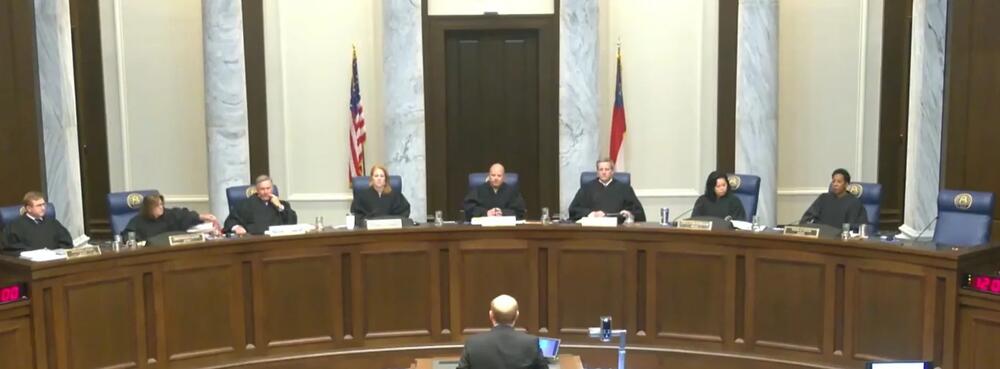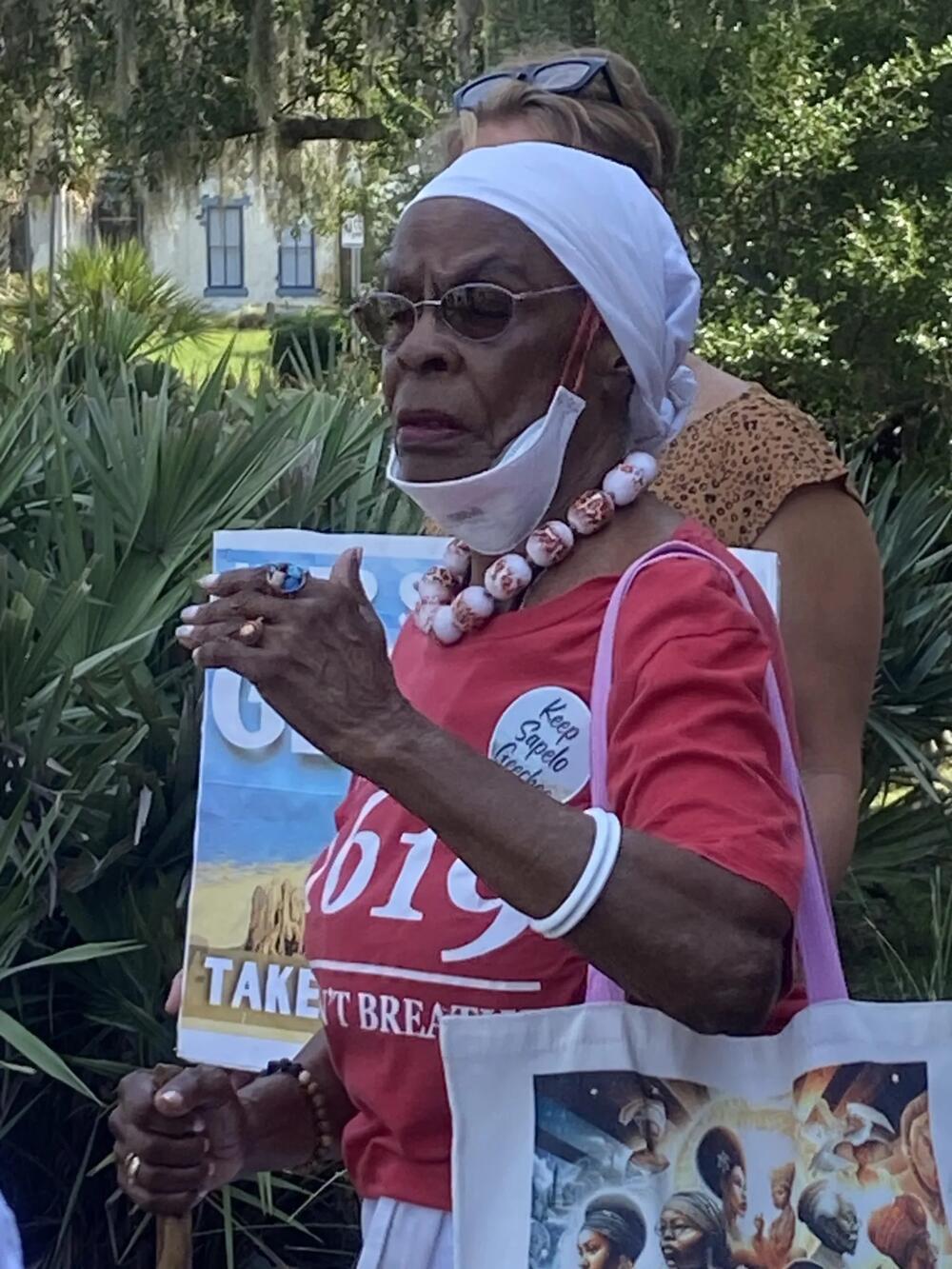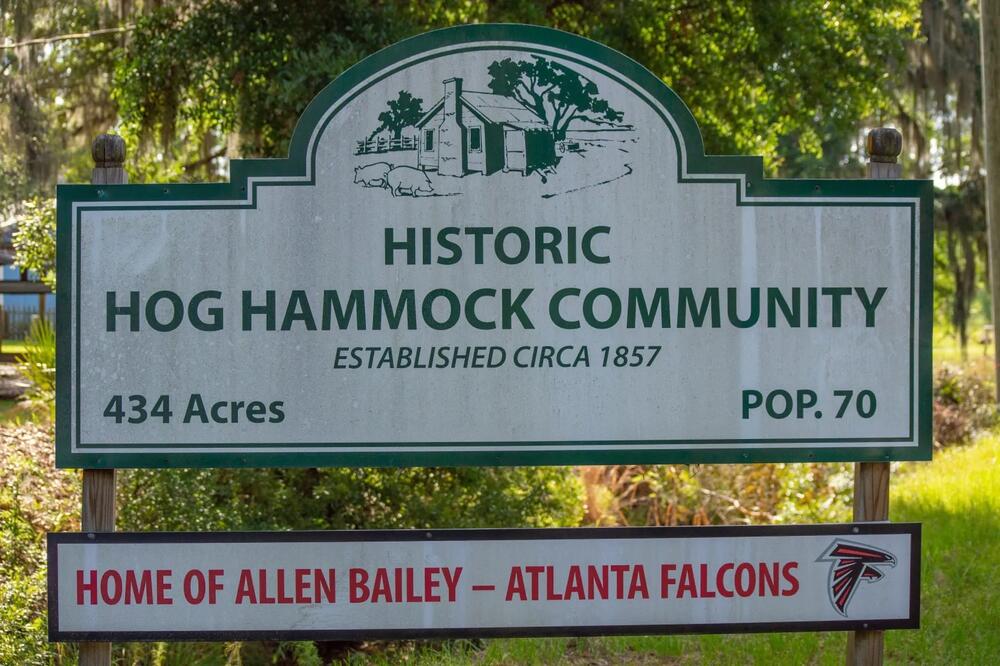
Caption
Attorney Philip Thompson argues his case in front of the Georgia Supreme Court April 16, 2025.
Credit: Screenshot from https://www.gasupreme.us/oa-april-16-2025/

Attorney Philip Thompson argues his case in front of the Georgia Supreme Court April 16, 2025.
By Mary Landers — The Current
The Georgia Supreme Court on Wednesday heard oral arguments about a controversial zoning decision that threatens to change the character of an historic Gullah Geechee enclave in McIntosh County.
Attorney Philip Thompson, who represented Sapelo residents Barbara Bailey, Christopher Bailey, and Stanley Walker set the scene, telling the justices, “The purpose of this petition is to protect and preserve the Hogg Hummock community, one of the last Gullah Geechee communities in the United States and a cultural and historical treasure, both for the state, but also for the country as well as a whole.”

Alberta Mabry speaks to a press conference marking the submission of a petition to repeal the new zoning ordinance affecting Hogg Hummock on Sapelo Island.
The case stems from McIntosh’s decision in September 2023 to allow the construction of larger houses in the modest Hogg Hummock neighborhood. Longtime residents feared the resulting gentrification and the higher taxes that accompanied it would drive them out of their ancestral homes in favor of wealthy developers. The county seeks to expand its tax base.
About 96% of Sapelo is owned by the state. In the 434-acre neighborhood of Hogg Hummock, about 250 acres are owned by descendants of enslaved people brought to the island from West Africa. Hogg Hummock is listed on the National Register of Historic Places.
To undo the 2023 zoning, residents mounted a petition drive that collected enough signatures to force the county to hold a referendum on the issue. Early voting had already begun in September when the county sued its own Probate Court Judge Harold Webster to stop the referendum. Superior Court Senior Judge Gary McCorvey then agreed with the county that the referendum wasn’t legal, halting the voting midstream.
In a separate, ongoing lawsuit nine Black residents of Sapelo are suing the county in McIntosh Superior Court on the grounds that the zoning measure was unjust and discriminatory. Attorneys from Southern Poverty Law Center and Bondurant, Mixson & Elmore are representing the residents.
The Supreme Court heard oral arguments in the appeal of McCorvey’s decision Wednesday. Two other related cases were heard at the same time: Webster v. McIntosh County, and McIntosh County v. Webster et. al. These two cases deal directly with McIntosh’s Webster’s approval of the referendum.
The state constitution’s “Home Rule” provision lays out the referendum process, which allows for a vote on “local acts or ordinances, resolutions, or regulations” if the requisite number of county residents sign a petition requesting it.
It’s not the first time a referendum issue has come before the high court. Camden County held a referendum on a proposed spaceport in 2022. The county objected to the referendum in Camden v. Sweatt, but in a unanimous decision the high court affirmed the validity of that vote.
Much of Wednesday’s hearing dealt with whether referenda can be employed to revoke zoning decisions. The county contends the Home Rule provision doesn’t apply to zoning, while the residents and Webster say it does. The justices probed both sides, trying to discern the original intent of lawmakers in a maze of paragraphs and subparagraphs. The questions turned esoteric at times.
“You have paragraph (a) that expressly reserves to the General Assembly, I think, a sort of substantive power to expand or limit anything that comes under that,” said Justice Andrew Pinson. “And then in paragraph four, it reserves to the General Assembly the more limited power to enact procedural things. And so I see there’s sort of a tension between, if zoning comes under (a) what about four?”
Those questions reflected the need to clarify the little-used provision of the Constitution, Thompson said.
“The justices were clearly very well prepared and very tuned in to the difficulties presented by the language of the Constitution,” Thompson told The Current after the hearing. “By language that hasn’t been tested a lot, certainly not on the scale it was tested in the Camden case and now tested here. We feel confident in our position. It’s only a good thing that the judges were so keyed in.”
The justices also examined the fact that the county was suing its own probate judge in his official capacity.

Sign designating the Historic Hog Hammock Community on Sapelo Island.
“He’s a county official, right? asked Chief Justice Nels S. D. Peterson. “So isn’t a suit by the county against a county official in their official capacity, essentially a suit by the county against the county?”
The situation means that McIntosh is paying for the attorneys on both sides of its case against Webster.
Several justices seemed concerned that the zoning ordinance in question was not included in the filings.
“So if we don’t have that in the record, what is the court to do?” asked Justice Verda M. Colvin. Jarrard referred them to the language of the referendum question.
The hearing lasted about 45 minutes and can be viewed here.
“McIntosh County appreciated the opportunity to present its position to the Georgia Supreme Court,” Jarrard said. “The County looks forward to receipt of the Court’s ruling.”
This story comes to GPB through a reporting partnership with The Current.